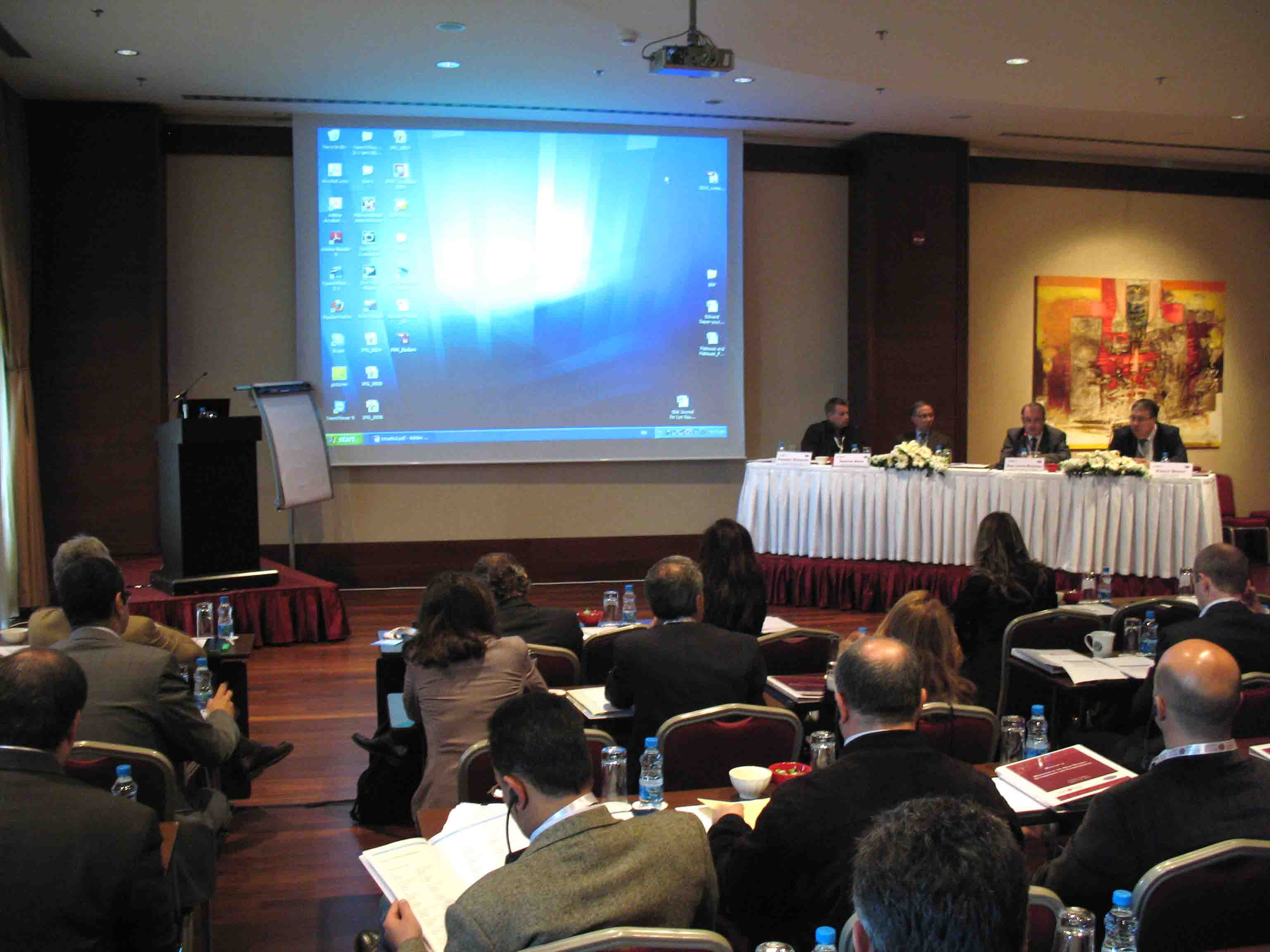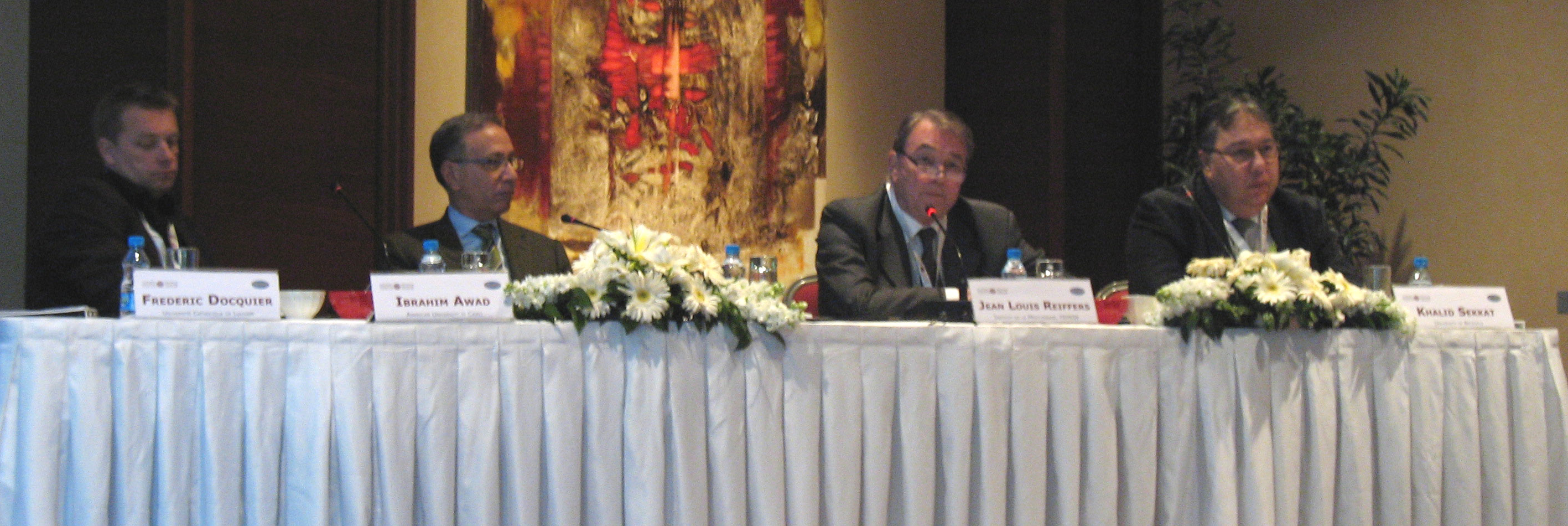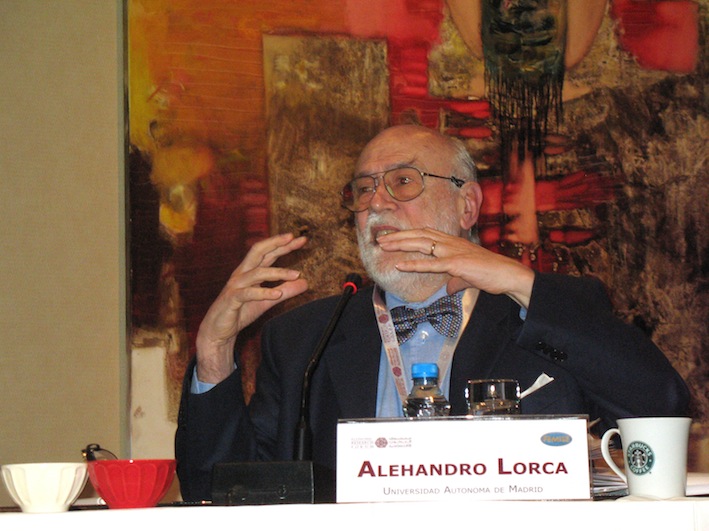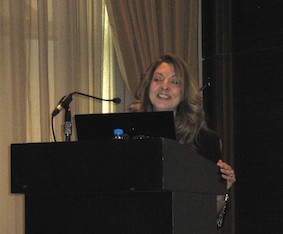Theme : Migration in the Arab Region: Causes and Consequences
Place : Istanbul, Turkey
Date : From 16 to 17 april 2011
 FEMISE and ERF (Economic Research Forum), jointly organized a workshop in Istanbul on 16 and 17 April 2011 under the theme of: “Migration in the Arab Region: Causes and Consequences“, to better understand the evolution of the migration phenomenon in the Mediterranean.Best-qualified researchers in the field presented results of their latest research and exchanged their views on the subject. (Photo FEMISE: from left : F. Docquier, I. Awad, JL.Reiffers et K. Sekkat).
FEMISE and ERF (Economic Research Forum), jointly organized a workshop in Istanbul on 16 and 17 April 2011 under the theme of: “Migration in the Arab Region: Causes and Consequences“, to better understand the evolution of the migration phenomenon in the Mediterranean.Best-qualified researchers in the field presented results of their latest research and exchanged their views on the subject. (Photo FEMISE: from left : F. Docquier, I. Awad, JL.Reiffers et K. Sekkat).
The Mediterranean region is among those in the world where migration plays a central role. It is characterized by large inflows and outflows of workers, by a large stock of migrants abroad and by the main role played by migrants’ remittances in the macroeconomic balance of home countries. Some Med countries like Morocco, Algeria and Lebanon are responsible for some of the largest Diasporas abroad. There are also significant flows of migrants from Arab countries (especially along with the Gulf countries) that develop as the South-South integration continues to deepen.
The purpose of this workshop was to review the analytic work done by researchers specialized on some of the most important aspects of migration in the region by addressing the following questions: What is the overall impact of migration on employment, education, social welfare and democracy? What is the influence of the Diaspora on domestic institutions? Can remittances promote financial development and entrepreneurship? Can they reduce poverty and inequality? The seminar was concluded with the presentation of a research agenda to develop in the future, some of which will notably be proposed to the FEMISE Scientific Committee for its forthcoming call for proposals. Below a short presentation of the main messages communicated during the two days, and at the end of the article, links to all papers and presentations.
 Frédéric Docquier (University of Louvain) and Khalid Sekkat (University of Brussels), show that joint analysis regarding causes and consequences of migration, although determinant, was still a neglected research area. On issues related to the overall impact of migration, researchers found the following: First, it is clear that economic variables play a predominant role and that emigration is largely influenced by factors such as income differentials between countries or network effects ; second, migration may generally lead to a “brain gain” for the country of departure, the hypothesis of a “brain drain” made during the 80s has been overtaken by the need for countries to be an integral part of globalization. Thus, the workshop emphasized that although the migration of skilled workers can have negative effects in the short term, it can have a positive impact on employment, wages and social welfare on origin countries in the long term. It was noted that the migration of qualified women produced significant effects on fertility, child health and education.
Frédéric Docquier (University of Louvain) and Khalid Sekkat (University of Brussels), show that joint analysis regarding causes and consequences of migration, although determinant, was still a neglected research area. On issues related to the overall impact of migration, researchers found the following: First, it is clear that economic variables play a predominant role and that emigration is largely influenced by factors such as income differentials between countries or network effects ; second, migration may generally lead to a “brain gain” for the country of departure, the hypothesis of a “brain drain” made during the 80s has been overtaken by the need for countries to be an integral part of globalization. Thus, the workshop emphasized that although the migration of skilled workers can have negative effects in the short term, it can have a positive impact on employment, wages and social welfare on origin countries in the long term. It was noted that the migration of qualified women produced significant effects on fertility, child health and education.
The Diaspora also has a significant influence on the institutions of the country of origin: Michel Beine (University of Luxemburg), illustrates this with an analysis of the direct and indirect impact and economic effects of migration on international institutions. Remittances and norms’ transfer have a significant and positive impact on democracy, transparency and education in particular. The research conducted by Jad Chaaban (American University of Beirut) and Wael Mansour (Lebanon World Bank) confirms and highlights the positive impact of remittances on education in 3 countries (Jordan, Syria and Lebanon).
 The recent waves of uprising in the Arab world have been caused by the discontent of the younger generation to the issues of unemployment and lack of freedom. Alejandro Lorca (Universidad Autonoma de Madrid) suggests that migration and remittances, however, cannot substitute for effective policies and reforms in the economic and political sphere of the origin country. Governments of the origin countries must create enough jobs to absorb labour, and the European Union should encourage this development to ensure economic stability in the Euromed region.
The recent waves of uprising in the Arab world have been caused by the discontent of the younger generation to the issues of unemployment and lack of freedom. Alejandro Lorca (Universidad Autonoma de Madrid) suggests that migration and remittances, however, cannot substitute for effective policies and reforms in the economic and political sphere of the origin country. Governments of the origin countries must create enough jobs to absorb labour, and the European Union should encourage this development to ensure economic stability in the Euromed region.
Can migrants’ remittances also promote financial development and entrepreneurship in the country of origin? Do they have an impact on Poverty and Inequality? El Mouhoub Mouhoud (University Paris Dauphine) presented the first results of a survey on the determinants and the use of transfers from France to the Maghreb countries. Return migration represents a significant percentage of entrepreneurs and a significant economic contribution that influences the development process.
 This point is also confirmed by the research of Jackline Wahba (University of Southampton) and Bachir Hamdouch (National Institute of Statistics and Applied Economics, Morocco) which addresses the impact of returning migrants on the labour market in the MENA region through various studies on countries such as Egypt and Morocco. The Moroccan Diaspora constitutes 10% of the population and remittances 9% of GDP, and plays an important role in reducing poverty and inequality. Returning migrants are more likely to become self-employed (entrepreneurs) or employers and tend to earn 46% more than non-migrants. The research conducted by Ragui Assaad (University of Minnesota) confirmed that male migration increases the supply of the female labour force generating a profound impact on households.
This point is also confirmed by the research of Jackline Wahba (University of Southampton) and Bachir Hamdouch (National Institute of Statistics and Applied Economics, Morocco) which addresses the impact of returning migrants on the labour market in the MENA region through various studies on countries such as Egypt and Morocco. The Moroccan Diaspora constitutes 10% of the population and remittances 9% of GDP, and plays an important role in reducing poverty and inequality. Returning migrants are more likely to become self-employed (entrepreneurs) or employers and tend to earn 46% more than non-migrants. The research conducted by Ragui Assaad (University of Minnesota) confirmed that male migration increases the supply of the female labour force generating a profound impact on households.
These studies confirm that international migration is crucial for the global economy and return migration has a significant economic contribution in the origin country especially through savings and capital accumulation.
To conclude the workshop, the last session was devoted to investigate areas for future research on the topic of migration. Current research is mainly conducted on the relationship between remittances and poverty, education, entrepreneurship and wages, while future research should seek to analyze the effects of financial crisis on migrant remittances on receiving countries or study the impact of the Diaspora on the institutions of the country of origin focusing on governance, corruption and democracy. The impact of family reunification policies on female migration and gender studies of migration are also areas of research currently neglected. Other questions can be addressed, such as the determinants of illegal migration and its consequences. Is there a balance between the needs of the region between the North and South shores? And how to analyze and optimize the temporary and circular migration phenomenon?
Jackline Wahba University of Southampton recommends:
- More research to clarify policy on migration,
- Better understanding of the opportunities and challenges faced by immigrants and their families: the incentives and constraints they face,
- Access to necessary data and the use of reliable methods to achieve this research successfully.
In conclusion, Jean Louis Reiffers, coordinator and president of the FEMISE scientific Committee, stresses that on top of research based on micro-economic behaviour and the effects on brain gain, it is necessary to place migration in the consistent context of the greater region. This involves:
- Reasoning in the framework of North-South interdependence: the nature of the transfer equation, demographic complementarity, circular mobility, etc..
- To link the trends to increased migration from the South with the evolving capacities of integration in the North
- To go beyond the migration of people towards analyzing the migration of ideas, particularly through the development of ICT
- To raise the issue of immigration to the South (particularly from sub-Saharan Africa).
Access to the presentations:
1. Geographic, Gender and Skill Structure of International Migration by Frédéric Docquier, Marfouk, Ozden and Parsons (powerpoint presentation: see below F. Docquier paper 2)
2. A Unified Analysis of International Migration and Cross Country Inequality by Frédéric Docquier and Khalid Sekkat (download the powerpoint presentations by Docquier)
3. Skilled migration and the transfer of institutional norms by Michel Beine and Khalid Sekkat (download the powerpoint presentation)
4. Emigration and origin country’s institutions: Does the destination country matter? by Michel Beine and Khalid Sekkat (download the powerpoint presentation)
5. The Impact of Remittances on Education in Jordan, Syria and Lebanon by Jad Chaaban and Wael Mansour (download the powerpoint presentation)
6. Return Migration and Entrepreneurship in Morocco by Bachir Hamdouch and Jackline Wahba
7. Return Migration and Labor Market Outcomes in Egypt By Jackline Wahba
8. Egyptian Men Working Abroad: Labour Supply Responses by the Women Left Behind, By Ragui Assad (download the powerpoint presentation)
9. The Euro-Med Perspective on Migration: The Role of Economic and Social Reforms By Wai Mun Hong, Alejandro Lorca, Eva Medina (download the paper)
10. Impact des transferts de fonds sur la pauvreté et les inégalités : les premiers résultats d’une enquête conduite au Maroc by E.M. Mouhoud et Hicham Hanchane (download the paper/download the powerpoint presentation)
11. Towards a Future Research Agenda on International Migration in MENA By Jackline Wahba
Articles based on this workshop:

